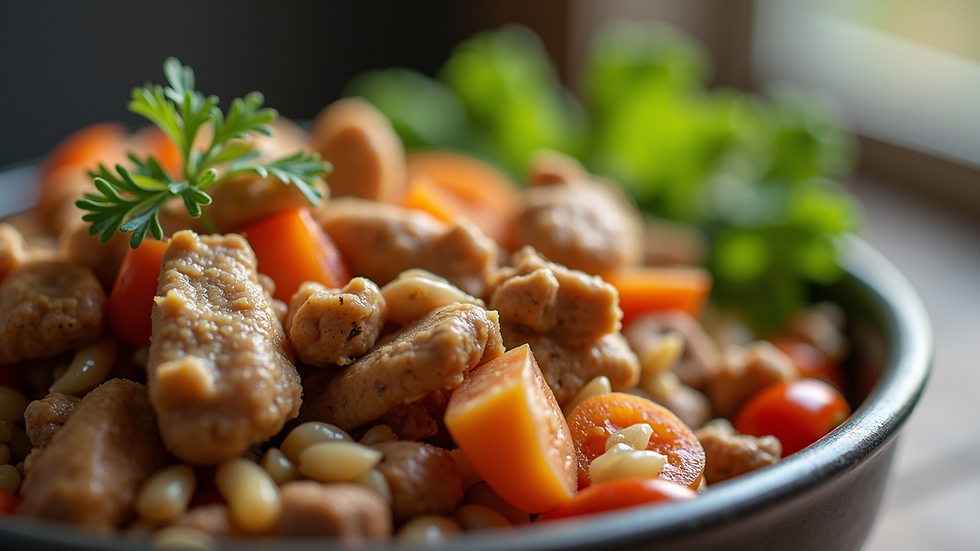Why Whole Foods Matter for Your Dog's Health
- Vanessa Bernot
- Aug 25, 2025
- 5 min read
When it comes to our furry friends, we all want the best for them. Just like us, dogs thrive on a balanced diet filled with nutrients. But what does that mean? Whole foods are the key to unlocking better health for your dog. In this post, we will explore why whole foods matter, how they can improve your dog's health, and practical tips for incorporating them into your pet's diet.
Whole foods are foods that are minimally processed and free from artificial ingredients. They include fresh fruits, vegetables, whole grains, and high-quality proteins. These foods provide essential nutrients that support your dog's overall health.
The Benefits of Whole Foods for Dogs
Whole foods offer numerous benefits for your dog's health. Here are some of the most important ones:
Nutrient Density: Whole foods are packed with vitamins, minerals, and antioxidants. These nutrients help support your dog's immune system, promote healthy skin and coat, and improve digestion.
Better Digestion: Whole foods are easier for dogs to digest compared to processed foods. They contain natural fibers that aid in digestion and help maintain a healthy gut.
Weight Management: Whole foods are often lower in calories and higher in nutrients. This means your dog can eat a satisfying amount while still maintaining a healthy weight.
Improved Energy Levels: A diet rich in whole foods can provide your dog with sustained energy throughout the day. This is especially important for active dogs who need fuel for play and exercise.
Reduced Allergies and Sensitivities: Many processed dog foods contain fillers and artificial ingredients that can trigger allergies. Whole foods are less likely to cause these issues, making them a safer choice for sensitive dogs.
Key Whole Foods to Include in Your Dog's Diet
Incorporating whole foods into your dog's diet can be simple and enjoyable. Here are some key foods to consider:
Fruits
Fruits are a great source of vitamins and antioxidants. Some dog-friendly options include:
Blueberries: Packed with antioxidants, blueberries can help fight inflammation and support brain health.
Apples: Apples are high in fiber and vitamin C. Just be sure to remove the seeds and core before feeding them to your dog.
Bananas: Bananas are a good source of potassium and can be a tasty treat for your dog.
Vegetables
Vegetables provide essential nutrients and fiber. Some great choices are:
Carrots: Crunchy and low in calories, carrots are great for dental health and can be a fun snack.
Sweet Potatoes: Rich in vitamins A and C, sweet potatoes are a nutritious addition to your dog's diet.
Green Beans: These are low in calories and high in fiber, making them a great option for weight management.
Proteins
High-quality proteins are essential for your dog's health. Consider these options:
Chicken: Lean and easily digestible, chicken is a popular protein choice for dogs.
Fish: Fish like salmon is rich in omega-3 fatty acids, which promote healthy skin and coat.
Eggs: Eggs are a complete protein source and can be a nutritious addition to your dog's meals.
How to Transition to Whole Foods
Transitioning your dog to a whole food diet can be done gradually. Here are some steps to help you make the switch:
Start Slow: Begin by mixing a small amount of whole foods into your dog's current diet. Gradually increase the amount over a week or two.
Monitor Your Dog: Keep an eye on your dog's reaction to the new foods. Look for any signs of allergies or digestive issues.
Consult Your Vet: Before making significant changes to your dog's diet, it's always a good idea to consult with your veterinarian. They can provide guidance based on your dog's specific needs.
Experiment with Recipes: There are many simple recipes available for homemade dog food. Experimenting with different combinations of whole foods can help you find what your dog enjoys most.
Common Misconceptions About Whole Foods
Despite the benefits, there are some misconceptions about whole foods for dogs. Let's address a few of them:
Whole Foods Are Too Expensive: While some whole foods can be pricier, many are affordable. Buying in bulk or choosing seasonal produce can help reduce costs.
Dogs Need Grain-Free Diets: Not all dogs require grain-free diets. Whole grains can provide essential nutrients and fiber. It's important to choose high-quality grains and monitor your dog's response.
Homemade Diets Are Complicated: Preparing whole food meals for your dog can be simple. With a little planning, you can create balanced meals without spending hours in the kitchen.
The Role of Supplements
While whole foods provide many nutrients, some dogs may still benefit from supplements. Here are a few common supplements to consider:
Fish Oil: Rich in omega-3 fatty acids, fish oil can support skin and coat health.
Probiotics: These can help improve gut health and digestion.
Multivitamins: A good multivitamin can fill in any nutritional gaps in your dog's diet.
Always consult with your veterinarian before adding supplements to your dog's diet.
Real-Life Success Stories
Many dog owners have seen remarkable improvements in their pets' health after switching to whole foods. Here are a couple of inspiring stories:
Bella the Beagle: Bella struggled with allergies and weight issues. After her owner transitioned her to a whole food diet, Bella's skin cleared up, and she lost the extra pounds. Now, she has more energy and enjoys her daily walks.
Max the Labrador: Max had digestive problems and was often lethargic. His owner started incorporating whole foods like sweet potatoes and green beans into his meals. Within weeks, Max's digestion improved, and he became more playful and active.
Making Whole Foods Fun for Your Dog
Incorporating whole foods into your dog's diet doesn't have to be boring. Here are some fun ideas to keep mealtime exciting:
DIY Treats: Make homemade treats using whole food ingredients. For example, you can bake sweet potato chews or freeze yogurt with fruit for a refreshing snack.
Interactive Feeding: Use puzzle toys or slow feeders to make mealtime more engaging. This can help stimulate your dog's mind while they enjoy their whole food meals.
Food Toppers: Add whole food toppings to your dog's regular food. A sprinkle of blueberries or a spoonful of pumpkin can make their meal more appealing.
The Bottom Line
Whole foods are essential for your dog's health and well-being. They provide the nutrients needed for a happy, active life. By incorporating whole foods into your dog's diet, you can help them thrive and enjoy a better quality of life.
Remember, every dog is unique. What works for one may not work for another. Always pay attention to your dog's individual needs and preferences. With a little effort and creativity, you can create a nutritious and delicious diet that keeps your furry friend healthy and happy.



Comments